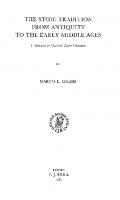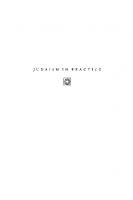The Idea of the Labyrinth from Classical Antiquity through the Middle Ages 9781501738463
Ancient and medieval labyrinths embody paradox, according to Penelope Reed Doob. Their structure allows a double perspec
219 43 21MB
English Pages 378 [367] Year 2019
Recommend Papers

- Author / Uploaded
- Penelope Reed Doob
- National Endowment for the Humanities Open Book Program
File loading please wait...
Citation preview
· THE IDEA OF · THE LABYRINTH
·
THE IDEA OF
·
THE LABYRINTH from Classical Antiquity through the Middle Ages Penelope Reed Doob
CORNELL UNIVERSITY PRESS ITHACA AND LONDON
Open access edition funded by the National Endowment for the Humanities/Andrew W. Mellon Foundation Humanities Open Book Program. Copyright © 1990 by Cornell University First printing, Cornell Paperbacks, 1992 Second paperback printing 2019 All rights reserved. Except for brief quotations in a review, this book, or parts thereof, must not be reproduced in any form without permission in writing from the publisher. For information, address Cornell University Press, Sage House, 512 East State Street, Ithaca, New York 14850. Visit our website at cornellpress.cornell.edu. Printed in the United States of America ISBN 978-0-8014-2393-2 (cloth: alk. paper) ISBN 978-1-5017-3845-6 (pbk.: alk. paper) ISBN 978-1-5017-3846-3 (pdf) ISBN 978-1-5017-3847-0 (epub/mobi) Librarians: A CIP catalog record for this book is available from the Library of Congress An open access (OA) ebook edition of this title is available under the following Creative Commons license: Attribution-NonCommercial-NoDerivatives 4.0 International (CC BY-NC-ND 4.0): https://creativecommons.org/licenses/ bync-nd/4.0/. For more information about Cornell University Press’s OA program or to download our OA titles, visit cornellopen.org. Jacket illustration: Photograph courtesy of the Soprintendenza Archeologica, Milan.
F or GrahamEric Parker worthy companion in multiplicitous mazes
and in memory of JudsonBoyceAllen and Constantin Patsalas
Contents
List of Plates
lX
Acknowledgments : Four Labyrinths
xi
Abbreviations
XVll
Introduction: Charting the Maze The Cretan Labyrinth Myth
1 11
PART ONE THE LABYRINTH IN THE CLASSICAL AND EARLY CHRISTIAN PERIODS
1 . The Literary Witness: Labyrinths in Pliny, Virgil, and Ovid
17
2.
39
The Labyrinth as Significant Form : Two Paradigms A clash o f paradigms 40 The multicursal model 46 The unicursal model 48 The essence of the maze 51
3 · A Taxonomy of Metaphorical Labyrinths
The labyrinth as a sign of complex artistry 66 The labyrinth as a sign of inextricability or impenetrability The labyrinth a s a sign o f difficult process 8 2
64 72
PART Two THE LABYRINTH IN THE MIDDLE AGES
4· Etymologies and Verbal Implications Vll
95
vm
Contents 5· Mazes in Medieval Art and Architecture
The three-dimensional labyrinth (buildings and gardens) Diagrammatic labyrinths 1 1 2 Turf and stone mazes 1 1 3 Labyrinths in churches 1 1 7 Labyrinths in manuscripts 1 33
6 . Moral Labyrinths in Medieval Literature The mythographers 1 48 Moral labyrinths in other literature Readings of selected texts 1 65 The Gesta Romanorum 1 65 Il Corbaccio 1 67 The Assembly of Ladies 1 7 1 La Queste del Saint Graal 1 7 5
103
101
1 45
1 55
7 . Textual Labyrinths : Toward a Labyrinthine Aesthetic Labyrinthine Inventio 1 98 Labyrinthine Dispositio 20 1 Labyrinthine Elocutio 2 1 1 Difficult process 2 1 3
PART THREE LABYRINTHS OF WoRDs: CENTRAL TEXTS AND INTERTEXTUALITIES
8. Virgil's Aeneid
227
g. Boethius's Consolation of Philosophy
2 54
1 0 . Dante's Divine Comedy
The labyrinthine landscape 2 8 1 The labyrinthine journey 2 8 7 The myth transformed and reenacted
1 1 . Chaucer's House of Fame
Appendix: Labyrinths in Manuscripts Index
27 1 294
307 34 1 343
List of Plates
I.
2. 3· 4· 5·
6. 7· 8. 9· 10. II.
1 2. •3 · •4· •5 ·
16. •7·
Prehistoric Cretan-style labyrinth rock carving from Rocky Valley, near Tintagel, Cornwall Labyrinth from the Tragliatella wine-pitcher (Etruscan, seventh century B . c . ) Roman mosaic labyrinth, Via Cadolini, Cremona Early multicursal labyrinth, adapted from Claude Paradin's Devises hero'iques









